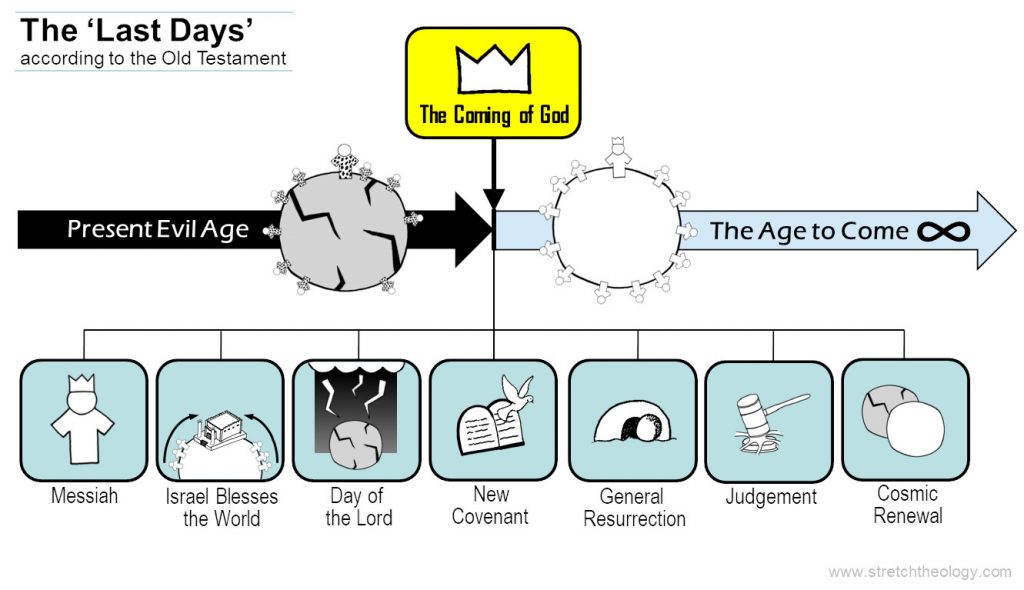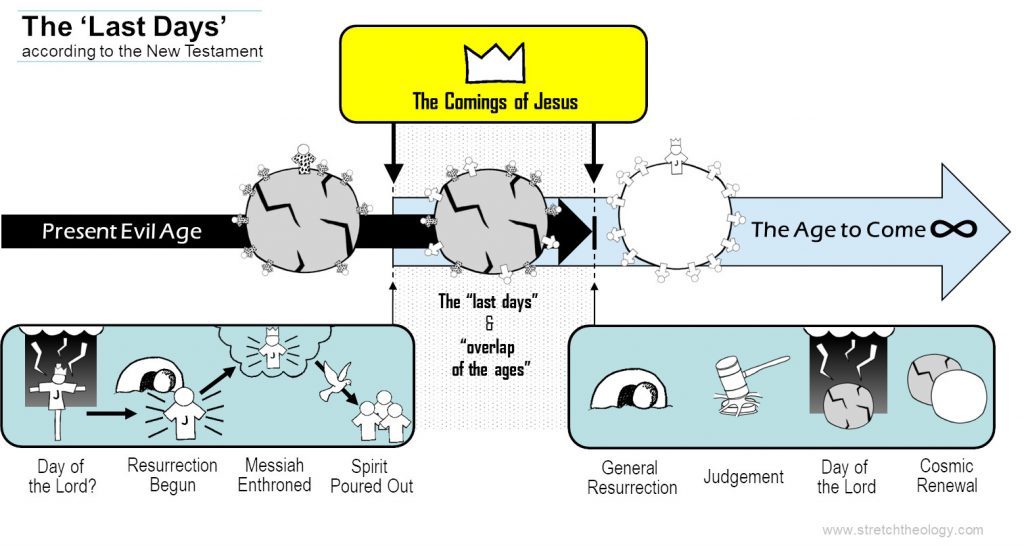
Not all cultures believe in history. Most ancient cultures thought of time as circular, having neither beginning nor end. History is a cycle of alternating golden ages and dark ages. This seems intuitive: the seasons cycle around year by year always the same; kingdoms rise and kingdoms fall and kingdoms rise up again. There is no obvious reason to believe that history has some greater purpose or direction. Whether you watch the weather or a clock-face, time moves in circles, taking us back to where we have already been.

The Bible gives a very different view, one that shatters our human intuitions. God made the world with a purpose that will be achieved in the course of time. History itself will be ‘fulfilled’ when it comes under the rule of the Lord Jesus and finds universal perfection and harmony in him (Ephesians 1:10).
Western culture’s philosophy of history grew out of Christianity. Today most people act like history is supposed to head somewhere largely because this biblical idea is embedded in our cultural past. Western culture once took the Bible very seriously. However, from the 17th century onwards, the development of scientific method combined with new anti-God philosophies led westerners to become so confident in our own abilities that we gradually reinvented the Christian view of history. We held onto the Christian idea that history is supposed to lead toward utopia, but removed Jesus from the picture. ‘Progress’ became a purely human project, and thus ‘utopia’ became within the grasp of humanity to achieve through our own wisdom and ingenuity. It’s a more sophisticated version of the Tower of Babel mindset. Whereas they built a tower upwards into heaven, humanity is now intent on building a tower of progress forwards into the future (Genesis 11:4).
The two world-wars of the 20th century shattered confidence in human ability to bring about utopia, but the old attitude appears to be regaining strength. Modern culture wars of ‘right’ versus ‘left’ represent competing philosophies of what makes for a good world. We all want a good world, but the level of passion that these debates excite shows an alarming underlying attitude: people act like they are fighting for nothing less than the salvation of society. Human utopia projects are always doomed to failure. The cultural battlegrounds will inevitably shift once again, but the Bible’s better hope will remain constant, as it always has.
Old Testament Eschatology
Theologians use the word eschatology (Greek: “last things”) to refer to what the Bible teaches about the end of history. Time isn’t just a topic in the Bible; it’s the framework for understanding the whole book. Throughout the Bible God makes promises that await fulfillment in the future. The prophets of the Old Testament repeatedly referred to the fulfillment of God’s promises as occurring in the “last days”, or “on that day”, or “in those days”, when God will arrive to decisively save, judge, and rule (e.g. Isaiah 2:2-4, 13:9; Jeremiah 33:15-16; Hosea 3:4-5). As soon as a prophet started talking about a ‘day’ or ‘days’ ahead he was talking about the time when God would fulfill his promises. The vague description of timing was deliberate. God’s timing is his own business; it is his people’s part to wait faithfully.
The Old Testament prophets promised that a lot of things would happen in the last days. In summary, it looked something like this:

At some point in history, God would arrive to bring salvation and judgement to the world. He would bring an end to the present evil age of sin, injustice, and godlessness, and he would rule over all things unopposed in the Age to Come.
Whilst this basic idea is clear enough, the specifics are more difficult to pin down. (Also, my overview is not comprehensive!). The Old Testament promises a large number of things that would happen in the last days, but it mostly isn’t clear how they fit together…

The great Messiah, the Son of David, would arrive to defeat their enemies and rule, bringing cosmic harmony (2 Samuel 7:12-16; Isaiah 11:1-16).

Israel was waiting for their Restoration, when their temple would become the center of the world to which the nations would gather (Isaiah 2:1-4; Jeremiah 3:17).

The Day of the Lord would come, which would be like the undoing of the fabric of creation itself in judgement (Isaiah 13:6-11; 24:1-3; Joel 2:31-32; Amos 5:18-20).

God would establish a New Covenant in which the law would be written on the hearts of his people (Jeremiah 31:31-34; Ezekiel 36:26-27; Joel 2:28-29).

The dead would be raised in a general Resurrection (Isaiah 26:19; Ezekiel 37:1-14; Daniel 12:2-3).

There would be Judgement of all, living and dead (Daniel 12:2-3; Ezekiel 7:8; Daniel 7:9-14).

Creation would be renewed to harmony and ‘shalom’ (Isaiah 11:6-9; 65:17-19; Ezekiel 47:1-12).
Israel would have to wait to see how all these things fit together. One of the most important distinguishing marks of a faithful Israelite was that they actively waited for God to fulfill his promises (e.g. Mark 15:43; Luke 2:25, 3:15, 12:35-38). There is lots of waiting in the Bible. God’s plans unfold in God’s timing, and his appointed timing is something he keeps to himself (Daniel 12:4; Matthew 24:36).
New Testament Eschatology
The coming of Jesus marked the arrival of the last days. God the Son arrived to save and to judge by becaming one of us (Colossians 2:9; Matthew 1:23). Jesus’ message was that the Kingdom of God had arrived (Mark 1:15), meaning that the future “Age to Come” had come into the present. God’s rule would soon extend over all things through Jesus. Jesus demonstrated the presence of the “Age to Come” by his miracles of healing and provision, and his driving away demonic powers wherever they showed themselves (e.g. read Mark 1-5). The power of the Kingdom of God centers on Jesus.
However, the coming of Jesus complicated Old Testament expectations considerably. People misunderstood the timing of Israel’s restoration (Acts 1:6) and of the resurrection (2 Timothy 2:18). Even John the Baptist was confused. When the Judgement of God didn’t arrive as John expected (Matthew 3:7-12), he sent his disciples to Jesus to inquire whether there had been some mistake. Jesus’ reply was to point to how he was dispensing promised end-time blessings to Israel (Matthew 11:2-6). Jesus was the expected Messiah and he would judge the world, but the judgement remained in the future (Matthew 25:31-46).
This confusion arose because Jesus divided the promised “Coming of God” into two parts. Jesus came first to win salvation, and will return to bring the salvation he has won to those who are waiting for him (Hebrews 9:27-28). The Day of Judgement has been delayed until that time so that people would have opportunity to turn to Christ (2 Peter 3:9). In the meantime, Jesus commissioned his followers to spread the news of salvation to all who need it (Matthew 28:18-20).
This two-fold coming of Jesus changes the picture to look something like this:

We presently live in the ‘last days’ promised in the Old Testament. The Resurrection Age has already begun with Jesus’ resurrection (Acts 4:2; 1 Corinthians 15:20-22). The eternal Messiah, the Son of David, is enthroned in heaven and will never lose his throne to death (Romans 1:2-4). Our traditional western calendar counts the number of years “A.D.”, Anno Domini, meaning “in the year of the Lord’s reign”. People of all nations are presently coming to Jesus, the true temple of God, to share in Israel’s salvation through hearing the gospel (Acts 11:18). Jesus has poured out his Holy Spirit onto all his people, writing his law on their hearts so they might obey him (Hebrews 10:15-16). All this shows that the Age to Come has already begun. These are the ‘last days’. Christians have begun living the eternal life of the Spirit now, even whilst we wait for it arrive in its fullness when Jesus returns (2 Corinthians 4:16; 5:2-4).
However, the present evil age continues. People still sin and openly blaspheme the true and living God. Satan continues to tempt and to lead astray. Most pointedly, death still reigns. The present age will not end until death, the “last enemy”, is destroyed (1 Corinthians 15:26). For that we must wait for Jesus to return with judgement and justice, and to remake creation into an eternal dwelling fit for resurrection bodies.
The Old continues until death ends. The New began when Jesus rose. These two ages overlap in the present, pulling us in opposite directions. Hence, theologians also refer to this overlap of ages as the ‘eschatological tension’. We’ll have much more to say on that and why it matters in upcoming posts…
